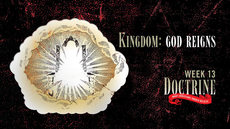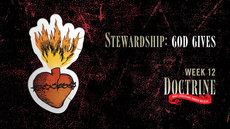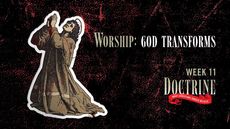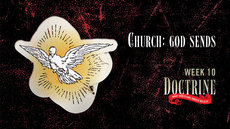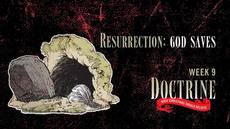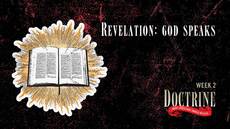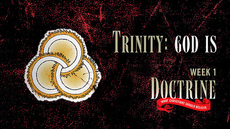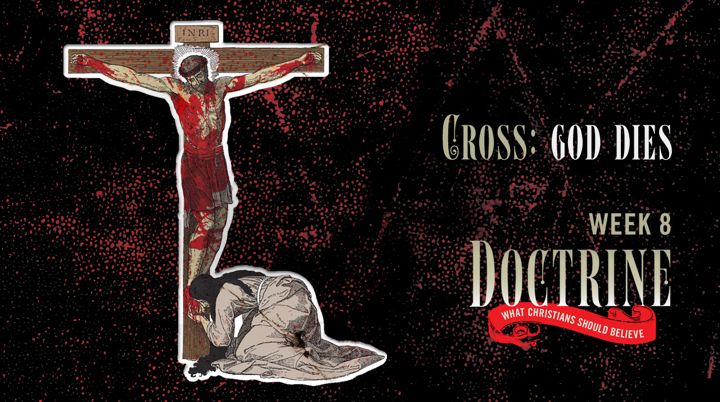
This article is a summary of the content from my sermon on the atoning death of Jesus Christ, titled Cross: God Dies, as part of the Doctrine: What Christians Should Believe preaching series. Much of this content is from Chapter 6 (What Did Jesus Accomplish on the Cross?) of the book Dr. Gerry Breshears and I wrote together called Vintage Jesus: Timeless Answers to Timely Questions. I will quote it throughout to both serve you and whet your appetite to purchase the entire book for yourself. You can order it online at Crossway.
Also, these themes of atonement will be more thoroughly covered in our next book Death by Love due out at the end of September. In it, each chapter tells the story of someone who has sinned or been sinned against, and I include a pastoral letter explaining how Jesus’ death on the cross makes the difference in their life. The tone of the book is exactly the opposite of the more comedic Vintage Jesus and reflects more of my pastoral role one-on-one with people I love. Dr. Breshears and I have poured many hours into this book and believe it is an important and practical contribution to the study of Jesus’ death. Pre-orders of Death by Love are now available online at Amazon.
Lastly, in the media library at Mars Hill's website you will find a full set of 12 sermons and sermon notes from a series I did on Jesus’ death titled Christ on the Cross, all available free for those who are interested. We will now proceed to answer some of the more common questions about Jesus’ death on the cross.
What is crucifixion?
Quoted from Vintage Jesus Chapter 6
Crucifixion was invented by the Persians around 500 BC, perfected by the Romans in the days of Jesus, and not outlawed until the Emperor Constantine, who ruled Rome in the fourth century AD. In the days of Jesus, crucifixion was reserved for the most horrendous criminals. Even the worst Romans were beheaded rather than crucified. The Jews also considered crucifixion the most horrific mode of death, as Deuteronomy 21:22–23 says, "And if a man has committed a crime punishable by death and he is put to death, and you hang him on a tree, his body shall not remain all night on the tree, but you shall bury him the same day, for a hanged man is cursed by God."
How did Jesus die?
Quoted from Vintage Jesus Chapter 6
To ensure maximum suffering, scourging preceded crucifixion. Scourging itself was such a painful event that many people died from it without even making it to their cross. Jesus’ hands would have been chained above his head to expose his back and legs to an executioner’s whip called a cat-o’-nine tails. The whip was a series of long leather straps. At the end of some of the straps were heavy balls of metal intended to tenderize the body of a victim, like a cook tenderizes a steak by beating it. Some of the straps had hooks made of either metal or bone that would have sunk deeply into the shoulders, back, buttocks, and legs of the victim. Once the hooks were sunk deeply into the tenderized flesh, the executioner would rip the skin, muscle, tendons, and even bones off the victim as they shouted in agony, shook violently, and bled heavily. Hundreds of years prior, the prophet Isaiah predicted the results of Jesus’ scourging: "many were astonished at you—his appearance was so marred, beyond human semblance, and his form beyond that of the children of mankind." (Isa. 52:14)
Jesus then had a crown of lengthy thorns pressed into his head as onlookers mocked him as the "King of the Jews." (Matt. 27:29) With that, blood began to flow down Jesus’ face, causing his hair and beard to be a bloodied and matted mess, and his eyes to burn as he strained to see through his own sweat and blood. Jesus’ robe was then used as the pot in a gambling dice game.
Jesus was then forced to carry his roughly hewn wooden crossbar of perhaps one hundred pounds on his bare, traumatized, bloodied back and shoulders to his own place of crucifixion. The cross was likely already covered with the blood of other men. Timber was so expensive the crosses were recycled, so Jesus’ blood mixed with the layers of blood from countless other men who had walked that same path before him.
Despite his young age and good health, Jesus was so physically devastated from his sleepless night, miles of walking, severe beating, and scourging that he collapsed under the weight of the cross, unable to carry it alone. A man named Simon of Cyrene was appointed to carry Jesus’ cross. Upon arriving at his place of crucifixion, they pulled Jesus’ beard out—an act of ultimate disrespect in ancient cultures—spit on him, and mocked him in front of his family and friends.
Jesus the carpenter, who had driven many nails into wood with his own hands, then had five- to-seven-inch rough metal spikes driven into the most sensitive nerve centers on the human body in his hands and feet. Jesus was nailed to his wooden cross. At this point Jesus was in unbearable agony. Nonetheless, Hindus are prone to deny that Jesus suffered at all.
Why did Jesus die?
Quoted from Vintage Jesus Chapter 6
The Bible teaches that in perfect justice, because Jesus was made to be our sin, he died for us. The little word for has big implications. In theological terms, it means that Jesus’ death was substitutionary (or, as some used to call it, vicarious). His death was in our place solely for our benefit and without benefit for himself. Just to be perfectly clear, this means that Jesus took the penalty for our sins in our place so we do not have to suffer the just penalty ourselves. The wrath of God that should have fallen on us and the death that our sins merit fell on Jesus. This wasn’t something forced on him. Rather, he took it willingly (John 10:18; Phil. 2:8; Heb. 12:2). Scripture repeatedly stresses this point, which theologians call penal substitutionary atonement [emphases added]:
- Isaiah 53:5 "But he was wounded for our transgressions; he was crushed for our iniquities; upon him was the chastisement that brought us peace, and with his stripes we are healed."
- Isaiah 53:12 ". . . he poured out his soul to death and was numbered with the transgressors; yet he bore the sin of many, and makes intercession for the transgressors."
- Romans 4:25 "[He] was delivered up for our trespasses . . ."
- Romans 5:8 "But God shows his love for us in that while we were still sinners, Christ died for us."
- 1 Corinthians 15:3 "Christ died for our sins . . ."
- 1 Peter 3:18 "For Christ also suffered once for sins, the righteous for the unrighteous, that he might bring us to God . . . "
- 1 John 2:2 "He is the propitiation for our sins, and not for ours only but also for the sins of the whole world."
- Galatians 3:13 "Christ redeemed us from the curse of the law by becoming a curse for us . . ."
What did Jesus’ death accomplish?
In our book Death by Love, due out at the end of September, Dr. Gerry Breshears and I will answer this question in great detail, as the entire book is essentially a series of answers to this question. For the time being, I will simply stress that many things were accomplished on the cross. It is a great and tragic error when reductionism occurs and all of what Jesus' death accomplished is not fully appreciated. When this kind of error occurs usually Jesus becomes merely a great moral example among liberals, or a defeater of Satan among Charismatics and Pentecostals. In an effort to briefly show some of the many aspects of what Jesus accomplished, I will outline these aspects of his accomplishments as well as the penal substitutionary atonement that we covered in the previous question. That point is the central, essential, and guiding principle for understanding what Jesus’ death accomplished on the cross, according to theologians such as John Stott and Leon Morris.
-
Jesus is our Propitiation
1 John 4:10 - "In this is love, not that we have loved God but that he loved us and sent his Son to be the propitiation for our sins."
In this we see that while God justly and rightly hates our sin, he also is so loving that he poured out his wrath upon himself so that it would be propitiated, or diverted, from guilty deserving sinners. In propitiation Jesus fulfills the role of the first goat slaughtered every year on the Day of Atonement in place of guilty sinners. Tragically, most modern English translations of the Bible translate this word with words including expiation or sacrifice or atonement, which change the meaning of God’s inspired Scriptures. But, thankfully my friends at Crossway have preserved this and other significant theological words in the English Standard Version of the Bible, one of the reasons why I have chosen the English Standard Version as my primary preaching, teaching, and writing translation, although there are other versions I appreciate in varying degrees.
-
Jesus is our Expiation
1 John 1:7 - "But if we walk in the light, as he is in the light, we have fellowship with one another, and the blood of Jesus, his Son, purifies us from all sin."
When we sin and are sinned against, the Bible says (particularly in many Old Testament ceremonies, cleansings, and metaphors) that we are defiled, dirty, filthy, and unclean. But on the cross Jesus took away our sin so that we could be cleansed from the presence and power of defiling sin. In expiation Jesus fulfills the role of the second goat, or scapegoat, who was not slaughtered but rather sent away from the people, showing how God alone can take our sin away.
-
Jesus is our New Covenant Sacrifice
1 Peter 1:18–19 - ". . . you were ransomed from the futile ways inherited from your forefathers, not with perishable things such as silver or gold, but with the precious blood of Christ, like that of a lamb without blemish or spot."
Blood is mentioned some 450 times in the Bible and is associated with death that is the penalty for sin. Many of the references to blood in Scripture are found in the Old Testament, foreshadowing Jesus coming as our High Priest, he whose body was the Temple, he who bled and died as a sacrifice so that we would be admitted into New Covenant relationship with God.
-
Jesus is our Victor
Colossians 2:13–15 "And you, who were dead in your trespasses and the uncircumcision of your flesh, God made alive together with him, having forgiven us all our trespasses, by canceling the record of debt that stood against us with its legal demands. This he set aside, nailing it to the cross. He disarmed the rulers and authorities and put them to open shame, by triumphing over them in him."
On the cross Jesus seemed to have suffered the worst defeat in history. But in fact he was triumphing over Satan and demons by destroying any claim they had to his people because of their sin. Therefore, Jesus is the only Victor over Satan and demons, and in Jesus we can live free of demonic control.
-
Jesus is our Redemption
Titus 2:13- 14". . . our great God and Savior Jesus Christ, who gave himself for us to redeem us from all lawlessness and to purify for himself a people for his own possession who are zealous for good works."
Sin enslaves us and rules over us as a cruel taskmaster, much like the Pharaoh who ruled over God’s people in the days of Exodus. In that day, God crushed Pharaoh and liberated his people into freedom to worship him. That event is spoken of repeatedly throughout Scripture as a day of redemption, and it is the pattern of how Jesus liberated us from Satan, sin, and death on the cross. That was the day of our great Exodus.
-
Jesus is our Justification
Galatians 2:16 - "a person is not justified by works of the law but through faith in Jesus Christ, so we also have believed in Christ Jesus, in order to be justified by faith in Christ and not by works of the law, because by works of the law no one will be justified."
2 Corinthians 5:21 - "For our sake he made him to be sin who knew no sin, so that in him we might become the righteousness of God."
Because we are all by nature and choice guilty sinners, we have no right to stand before God and be declared righteous. But on the cross Jesus accomplished our justification through what Martin Luther rightly called "the great exchange." On the cross Jesus took our sin and gave us his righteousness. The result is that by grace alone, through faith in Jesus alone, we can be justified and declared righteous in the sight of God.
-
Jesus is our Ransom
1 Timothy 2:5–6 - "For there is one God, and there is one mediator between God and men, the man Christ Jesus, who gave himself as a ransom . . ."
Our sin includes both omission (not doing what God commands) and commission (doing what God forbids) so that we accrue an ever-mounting debt to God. To resolve this debt, Jesus came as fully God and fully human to mediate perfectly between God and us. In his death, Jesus paid our debt to God, described as our ransom.
-
Jesus is our Example
1 Peter 2:21 - "Christ also suffered for you, leaving you an example, so that you might follow in his steps."
While on the cross suffering and dying in our place for our sins, while remaining obedient to the Father and loving to his enemies, Jesus gave for us the perfect example of how to live, especially in the face of the unjust, evil, atrocity of sin. In so doing, he trusted the sovereignty of God to bring good out of evil. Jesus is our example that life in this world is marked by the pains of sin and we have opportunities to demonstrate the glory of Jesus to the world by following in his example and embracing our suffering without questioning the goodness of God.
-
Jesus is our Reconciliation
Ephesians 4:31-5:2 – "Let all bitterness and wrath and anger and clamor and slander be put away from you, along with all malice. Be kind to one another, tenderhearted, forgiving one another, as God in Christ forgave you. Therefore be imitators of God, as beloved children. And walk in love, as Christ loved us and gave himself up for us, a fragrant offering and sacrifice to God."
Sin breaks our relationship with God and others, as we first see in Genesis 3, where immediately following sin our first parents hid from God and from one another. But by dying for our sin, Jesus takes our sin away so that we can be in a loving, reconciled relationship with God and one another.
-
Jesus is our Revelation
John 1:18 - "No one has ever seen God; the only God, who is at the Father’s side, he has made him known."
Colossians 1:15 - "He [Jesus] is the image of the invisible God."
Because of sin, the Bible says we are spiritually ignorant and blind concerning God. But in Jesus God made himself visible. And at the cross the character and nature of God was revealed, unlike anywhere else in all creation, because it was there that God’s wrath and mercy were one. Therefore, for God to be known, the cross of Jesus must be understood, because it was there that God’s person shown forth in perfect glory.
Doesn’t the cross contradict God’s love?
Some research has been gathered on this question that may be particularly helpful. I would like to share some of that research with you in the following section.
Brian McLaren used the term "cosmic child abuse" (coined by Steve Chalke) to describe the idea of penal substitutionary atonement. McLaren puts this phrase on the lips of one of his most attractive characters in The Story We Find Ourselves In. McLaren quotes Chalke:
"The fact is that the cross isn't a form of cosmic child abuse—a vengeful Father, punishing his Son for an offense he has not even committed. Understandably, both people inside and outside of the Church have found this twisted version of events morally dubious and a huge barrier to faith. Deeper than that, however, is that such a concept stands in total contradiction to the statement: ‘God is love’. If the cross is a personal act of violence perpetrated by God towards humankind but borne by his Son, then it makes a mockery of Jesus' own teaching to love your enemies and to refuse to repay evil with evil." (See Steve Chalke and Alan Mann, The Lost Message of Jesus (Grand Rapids: Zondervan, 2003), pp. 182-183.)
A brief excerpt from the article "Interview with Brian McLaren about previous ‘A letter to Friends of Emergent,’" from McLaren’s own site is helpful. The anonymous interviewer asks McLaren:
Q: You wrote, "Which reminds us that none of us has a complete grasp of the gospel…. It's very dangerous to assume you've perfectly contained the gospel in your little formula." I think with all the other change going on, one thing we’ve got to hold firm on is the gospel.
A: What do you mean when you say "the gospel"?
Q: You know, justification by grace through faith in the finished atoning work of Christ on the cross.
A: Are you sure that’s the gospel?
Q: Of course. Aren’t you?
A: I’m sure that’s a facet of the gospel, and it’s the facet that modern evangelical Protestants have assumed is the whole gospel, the heart of the gospel. But what’s the point of that gospel? (Online at www.anewkindofchristian.com/archives/000133.html.)
McLaren’s reference to "cosmic child abuse" is on page 102 of The Story We Find Ourselves In. In this book, fictional characters drive the plot line and have theological discussions. On page 102, there is a conversation between a character name Kerry and another named Neo. Kerry is talking about the atonement, saying: "I know that’s supposed to mean something to me, and I suppose I can see it, but it raises so many questions. . . . For starters, if God wants to forgive us, why doesn’t he just do it? How does punishing an innocent person make things better? That just sounds like one more injustice in the cosmic equation. It sounds like divine child abuse."
McLaren’s character refers to Steve Chalke, an advocate of the "Christus-Victor" theology of atonement, as opposed to penal substitution. Chalke mocks the God of Jonathan Edwards (Lost Message of Jesus, page 56) and argues that the Bible "never defines him [God] as anything other than love" (Lost Message of Jesus, page 63). This is simply false as revealed in both 1 John 1:5 ("God is light") and Isaiah 6 and Revelation 4 ("God is holy").
Much more can and will be said when the chapter on this point is published in the Doctrine book following the conclusion of this preaching series. But for now I will close with a quote from Vintage Jesus Chapter 6:
Some will protest that a loving God could not possibly pour out his wrath on Jesus. Yet this is precisely what Scripture says: "Yet it was the will of the Lord to crush him; he has put him to grief." (Isa. 53:10) Others will protest that a loving God would never sanction the bloody, unjust murder of Jesus. Scripture plainly states, however, that it is at the cross of Jesus that the love of God for us is most clearly seen. Jesus himself said precisely this: "This is my commandment, that you love one another as I have loved you. Greater love has no one than this, that someone lays down his life for his friends." (John 15:12–13) Other Scriptures echo the words of Jesus—his death on the cross is the place where love is most clearly seen in all creation. John 3:16 says, "For God so loved the world, that he gave his only Son, that whoever believes in him should not perish but have eternal life." Romans 5:8 says, "but God shows his love for us in that while we were still sinners, Christ died for us." Finally, 1 John 4:9–10 says, "In this the love of God was made manifest among us, that God sent his only Son into the world, so that we might live through him. In this is love, not that we have loved God but that he loved us and sent his Son to be the propitiation for our sins."
Clearly, Jesus’ bloody death on the cross is about love and everyone who loves Jesus should know that.
